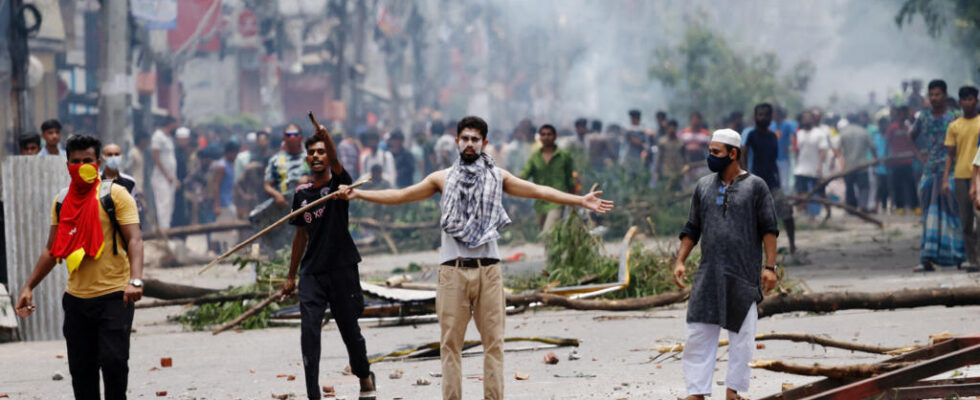In Bangladesh, a curfew was imposed on Friday, July 19, and the army was deployed to maintain order, nearly three weeks after the start of the protest movement that turned into a confrontation with the government. At least 105 people have died. One of the main opponents, Ruhul Kabir Rizvi Ahmed, was arrested on Friday. A prison was stormed by demonstrators. Hundreds ” of detainees were released, according to a police officer.
3 min
On Friday, one of the main opponents, Ruhul Kabir Rizvi Ahmed of the Bangladesh Nationalist Party (BNP), was arrested, police said. A prison in the central district of Narsingdi was stormed by protesters. Inmates fled the prison and protesters set fires ” said a police officer speaking on condition of anonymity and assessing ” hundreds ” the number of prisoners released. Faced with this situation, “theThe government has decided to impose a curfew and deploy the army ” said the office of Bangladeshi Prime Minister Sheikh Hasina.
After closing schools and universities earlier this week, authorities have also cut off the internet since Thursday. On Thursday, government buildings were “ burned and vandalized “, according to police, including the headquarters of state-owned Bangladesh Television (BTV). There, more than 700 people were injured, including 104 police officers and 30 journalists, according to private broadcaster Independent Television. Police confirmed that about 100 police officers were injured and about 50 police stations were set on fire. BTV had not resumed broadcasting on Friday.
More than 100 dead
And the toll reflects the unprecedented violence of the unrest shaking this country of 170 million people. At least 105 people have died since the start of the demonstrations, according to a count by Agence France-Presse (AFP) based on hospital sources. At least 52 people were killed on Friday in Dhaka, where the demonstrations continued despite a ban on all gatherings or public meetings in the capital, according to a list consulted by AFP at Dhaka University Hospital. Since the beginning of the week, police shootings have been responsible for more than two-thirds of the deaths, according to descriptions given by hospitals.
UN High Commissioner for Human Rights Volker Türk condemned the crackdown, calling it “the attacks.” particularly shocking and unacceptable ” He said to himself ” very concerned ” by reports that authorities are deploying paramilitary units such as the Border Guards of Bangladesh and the rapid action battalion, ” who have a long history of violations » human rights.
“We were told that if any of us published something against the government, we would be in danger, that the police would take action against us,” explains a student, reached by telephone on Thursday by Nicolas Roccajournalist in the international service of RFI.
Read alsoIn Bangladesh, “the police spare no one”
A fight that goes beyond quotas
The protests, which have been taking place almost daily since early July, are aimed at demanding an end to public sector hiring quotas. These quotas reserve more than half of the positions for specific groups, including the children of veterans of the country’s war of liberation against the Pakistan in 1971. This system favors those close to power, castigate its detractors who are now demanding the resignation of the government. Now it is our freedom that is at stake. We want it [le gouvernement] pay the price for the death of our brothers “, breathes the student reached by telephone by Nicolas Rocca.
The social crisis has thus turned into a political crisis for the Prime Minister, who has been booed during the demonstrations in the streets of Dhaka with cries of ” Down with the dictator ! ».
Sheikh Hasina and her party, the Awami League, have been accused of trying to silence all opposition since returning to power in 2009. She is accused of having unjustly imprisoned her main rival and limiting freedom of the press. She is also suspected of wanting to eradicate all dissent, in particular viathe extrajudicial killing of opposition activists, according to critics and rights activists.
